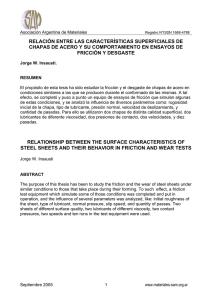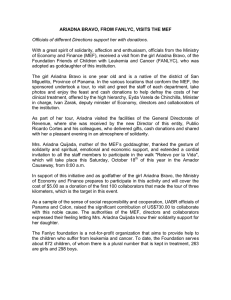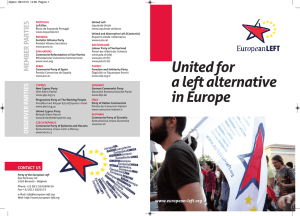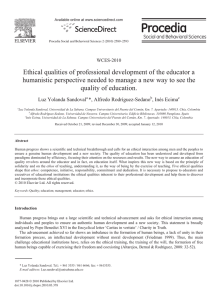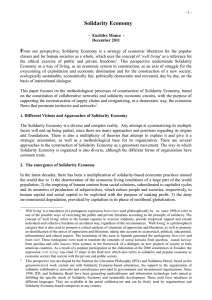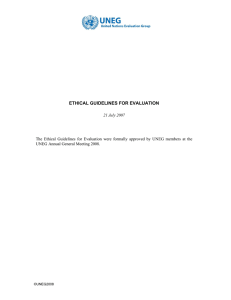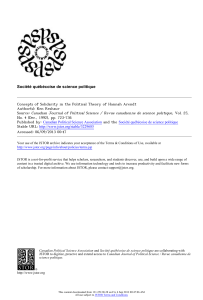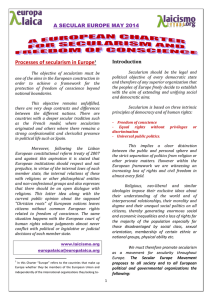The international economic crisis from point of view
Anuncio
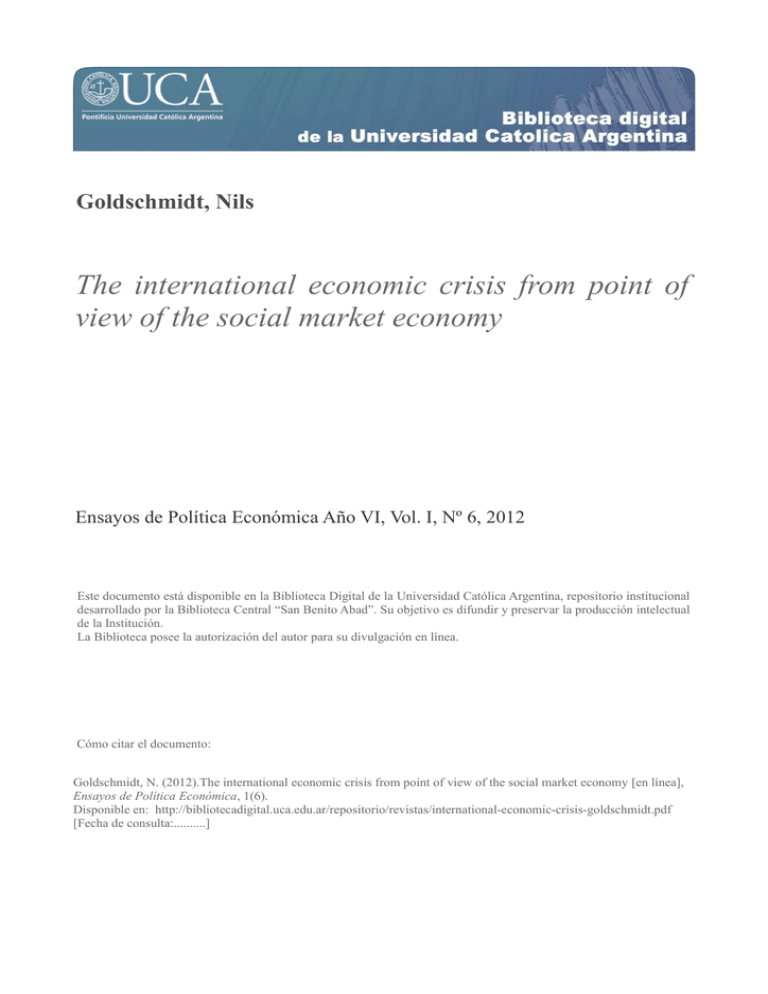
Goldschmidt, Nils The international economic crisis from point of view of the social market economy Ensayos de Política Económica Año VI, Vol. I, Nº 6, 2012 Este documento está disponible en la Biblioteca Digital de la Universidad Católica Argentina, repositorio institucional desarrollado por la Biblioteca Central “San Benito Abad”. Su objetivo es difundir y preservar la producción intelectual de la Institución. La Biblioteca posee la autorización del autor para su divulgación en línea. Cómo citar el documento: Goldschmidt, N. (2012).The international economic crisis from point of view of the social market economy [en línea], Ensayos de Política Económica, 1(6). Disponible en: http://bibliotecadigital.uca.edu.ar/repositorio/revistas/international-economic-crisis-goldschmidt.pdf [Fecha de consulta:..........] ENSAYOS DE POLÍTICA ECONÓMICA – AÑO 2012 THE INTERNATIONAL ECONOMIC CRISIS FROM POINT OF VIEW OF THE SOCIAL MARKET ECONOMY Prof. Dr. Nils Goldschmidt* Conferencia dictada el día miércoles 8 de agosto de 2012 como parte de la Cátedra Konrad Adenauer, “Escuela de Economía Francisco Valsecchi” de la Pontificia Universidad Católica Argentina (UCA). “Ladies and Gentlemen, It is my honor and my pleasure to talk to you on “The international economic crisis from the Social Market Economy point of view”. The title sounds good and promising – but I am afraid my remarks will disappoint you, at least a little bit. I am not able to present a clear solution for the crisis and I have no concrete arguments which were not said before, but my talk might shed a different light on the current crisis. I will begin by stating my main proposition: We will not solve the crisis with "solidarity" and this term “solidarity” isn't of much help in the current discussion. What we are politically dealing with or should deal with are mostly issues related to justice and fairness. Establishing this distinction is not merely a semantic exercise on my part, quite the contrary. I believe it has wide-reaching consequences on the academic and political discourse in times of crises. Allow me to elaborate more on this and what it means for the current political situation. The public perception of the current economic and financial crisis is ambivalent. On the one hand, the premise according to which events on the market are systemic is now largely assumed, and rare are those who challenge that assumption. Many believe that "the markets", with their own logic and dynamics, are to blame for recent crises. The computer-based, depersonalized transactions on the financial market have come to symbolize an economic driving force that the individual cannot escape. On the other hand, and at the same time, this systemic premise is being questioned in the current crisis and the blame is being put on individuals instead. Of course, the claim according to which it is the speculators, the managers and the businessmen with their greed who are responsible for the world financial and economic volatility and the ensuing political woes is far easier to sell, especially for the media, than the abstract representation of systemic demands to which the businessman on the market or the trader on the floor is subordinated to. From this perspective, the wrongdoings of some individuals have caused - or helped cause the crisis. Morality, virtue, solidarity are being called upon to form the foundation of economic and political activity. With this background in mind, I believe it is worthwhile to once again examine in detail the issue of the joint responsibility of individuals (in other words, solidarity) involved in economic relations. First: The market indeed does have its own logic - and this logic can easily be defined. It is all about making profits. A businessman who doesn't make a profit * Siegen University, Munich. 143 ENSAYOS DE POLÍTICA ECONÓMICA – AÑO 2012 hasn't reached his goal. Thus, the market - in line with German sociologist Niklas Luhmann - from the viewpoint of systems theory, must be understood as a closed functional entity following the principle of profitability. What is relevant here, a social and ethical perspective is that if I follow this principle, I will remain part of the market, but if I reject this logic (or if I underperform according to this logic), I will sooner or later be excluded from the system. A business that doesn't make any profits on the market will eventually go bankrupt. Let me quote Milton Friedman who, in his famous phrase, stated the fact with no detour: “The social responsibility of business is to increase its profits” - or in other words: “The business of business is business”. And indeed, no one can dispute the fact that market (capitalist) society, with its focus on profits, has brought about prosperity in a way that has never before been experienced in the history of mankind. The market economy and the principle of profitability is a winning concept. And there is also no ethical objection to society relying on such a mechanism. Being guest at a Catholic University let me quote Pope John Paul the Second, who in his social encyclical "Centesimus annus" presents the principle of profitability as a guideline to good business management: "The Church acknowledges the legitimate role of profit as an indication that a business is functioning well. When a firm makes a profit, this means that productive factors have been properly employed and corresponding human needs have been duly satisfied." (CA 35) This doesn't mean - if you'll allow me this remark - that businesses should solely focus on generating profits, as stated by Milton Friedman almost 50 years ago. I would argue instead that the conditions under which businesses operate today have fundamentally changed since then. Developments such as the increasing inability of the state to impose taxes, globalization without sufficient political order, the interaction with other cultures and values as well as the significance of employment as a means of integrating individuals into society, just to name the most important factors - all of this points to the fact that it is critical for businesses to take on more responsibility - by all means in their own interest - in order to be able to fulfill their primary role under these new circumstances: namely, to supply people with quality, reasonably-priced and innovative goods and services. A detailed discussion of this issue will have to be reserved for another time. But let me come back to the fundamental logic of the market and the necessity of making profits: this logic still holds in this time of economic and financial crisis. It is absurd to hold a bank (and those it employs) responsible for the financial crisis just because they sold high-risk products with the aim of generating profits or they strove to achieve a high return on equity. Indeed, businessmen, managers and employees are themselves constrained by the system, and generally, the only "choice" they have is to either follow the market logic (and pursue the system's target of generating profits) or, in extreme cases, to simply be completely excluded from the system. Nevertheless, accepting and recognizing that the market has its own systemic logic does in no way mean that all societal problems can be solved through this logic. More often than not, the market doesn't solve problems but creates them. And that is due precisely to its systemic nature. The only interests that can be realized on the markets are those that are compatible with the principle of profit making. In our modern society, the income generated on the market is an indispensable prerequisite to leading a meaningful life - without it, it is all but impossible to ensure participation in society. However, the many differing interests of individuals 144 ENSAYOS DE POLÍTICA ECONÓMICA – AÑO 2012 will only find their way on the market if they obey the market's logic. Interests such as health or education must be satisfied beyond the market, that is, resources need to be captured from the market in order to satisfy these goals. Regardless of one's precise opinion on the matter, in our modern market-based society the following conclusion can hardly be refuted: If, as a consequence of the market's functional logic, those who are excluded from the market form the blind spot of the market itself, and if at the same time we demand that in our modern enlightened society it be not the market but individual participation in society and the possibility to lead a meaningful life that be the regulative principle of our society, then it is necessary to set up a political framework to regulate the market and competition, and for the state to socially support those who are excluded from the market. In this sense, the shaping of the general economic framework is subjected to the logic of the political system and is the result of democratic decision-making processes. These observations and arguments lead us directly to the Social Market Economy. “Soziale Marktwirtschaft” (Social Market Economy) is not a precisely outlined theoretical system but more a "mélange" of socio-political ideas for a free and socially just society. It is that economic order that was established in Western Germany after 1945. Despite its vagueness, Social Market Economy is a decidedly liberal concept, based on individual freedom and the conviction that wellfunctioning markets and competition result in economic efficiency and hence in economic development (or, in the case of Germany, recovery) as well as social improvement. Yet in sharp contrast to the harmonious world of the "invisible hand" as we know it from Adam Smith, the "founding fathers" of the post-war economic order in Germany were convinced that the economic system must be guided by an "economic constitution" provided by the state. This does not mean central planning or state interventionism but rather the design of a legal framework and the formulation of a few general principles of economic policy, to which politicians have to adhere and which should be safeguarded by the state. Consequently, the role of the state in a Social Market Economy is not that of the “night watchman” (minimal state) ascribed to laissez-faire liberalism – a state that would be primarily concerned with the protection of its constituents life and property – but that of a “strong state"” powerful enough to protect workable markets from the threat of monopolistic power and privilege-seeking. Theoreticians and practitioners of the Social Market Economy were confident that by shaping a legal-institutional framework for a well-functioning market order it would be possible to fulfill the 19th century liberals' project. And they were confident that the principles that govern and maintain a well-functioning economic system over time would also provide the solution of the “social question”. You might not be surprised that – for a German being guest in Argentina – the perfect analogy for the Social Market Economy can be found in the field of football, of soccer. The idea is that the economy needs a framework of rules which safeguards the “economic game” and which is functioning in the sense of providing economic efficiency as well as fairness in the sense of social justice. Like in the soccer game where you have some fundamental rules – e.g. offside, only the goal-keeper is allowed to put up the ball with the hands and so on – you need some basic rules for a good game in economics. If you have defined the rules in the beginning, and if you have agreed on these rules as fair rules, then you can 145 ENSAYOS DE POLÍTICA ECONÓMICA – AÑO 2012 assume that the outcome is fair. To come back to the analogy of soccer: Even though I had whished for Germany to win the Euro championship last month I do have to accept the result that Spain had won, because their games had been fair games, that means it was played along the given framework of rules. And there is a second consequence of the analogy: If you accept the framework of rules, then there is no necessity to intervene directly in the game -- except if there is something happening that is against the rules of the games – for example when the referee presents the red card because of an assault. However: Defining the rules of the games means on the one hand that direct interventions into the system (in our case into the market system) are allowed only if there are clear offences against the rules of the game and that on the other hand players – that means in our case economic actors – do not have to think about the “fairness” of the rules. They only have to focus on their performance, that means how a given game can be played better, more successfully. To put it differently: The crucial aspect of the Social Market Economy is the focus put on the common good, which leads to imposing restraints on the market and offering assistance to those who do not take part in the market. In his social encyclical "Caritas in veritate", Pope Benedict the 16th clearly formulates this: "Economic activity cannot solve all social problems through the simple application of commercial logic. This needs to be directed towards the pursuit of the common good, for which the political community in particular must also take responsibility. ... The economic sphere is neither ethically neutral, nor inherently inhuman and opposed to society. It is part and parcel of human activity and precisely because it is human, it must be structured and governed in an ethical manner." (CiV 36) Now that we have dealt with political structures and institutions, we can now move on to addressing the issue of individual responsibility and the significance of solidarity in economic affairs. However unfortunate, there is a constant call, especially in times of crisis, on market actors to do business in an ethical and social fashion - in other words, a call for solidarity. Given the market's systemic process such as I exposed it previously, and the demands that this process imposes on the actions of market actors, I believe that a principle of "ethical prudence" should be applied when addressing the solidarity issue. Social problem areas and injustices arising on the market and in a globalized society can hardly be tackled in a systematic and lasting way by simply hoping that individual actors will become more virtuous and ethical and exhibit more solidarity. Not only would any individual be out of his depth trying to act in such a way, but all his actions would be doomed from the start in the face of the market system if he were to be required, again and again, to counter the logic of the market through his "be-good" attitude. The ancient principle "ultra posse nemo obligatur" - no one is obligated beyond what he is able to do - applies here as well. The principle of ethical prudence is thus translated as: Do not expect a member of society to durably take position against his own (economic) interests for the good of society, be it locally or globally. To better understand this principle of ethical prudence, it helps to establish a distinction between individual morality (individual or virtue ethics) and its derived solidarity on the one hand, and social justice (social ethics) on the other. The respective moral actions of the individual (or individuals) cannot be the primary building blocks in constructing society, especially not in a globalized world. Instead, 146 ENSAYOS DE POLÍTICA ECONÓMICA – AÑO 2012 society's structures need to be aligned with the social ethical imperatives of justice (and namely not with its individual ethical imperatives).These claims for justice, aimed at a civilized society, must be supported politically and find their way into legislation - however difficult this might be in a globalized world. In the same way it would be disastrous, faced with the threat of financial crises, to depend on managers' virtue rather than on the efficiency and the organizational potentials of political imperatives. This doesn't mean - and I insist on this point - that managers (and politicians as well, of course) should not be good people, and it certainly doesn't mean that society can afford not to educate its members and do without responsible citizens. The principle of ethical prudence simply reminds us of the fact that we, as a society, shouldn't start from the "wrong side" when addressing the issue of a just society. There is a hierarchy of accountability when it comes to ethical responsibility. Establishing a political framework allowing for the creation of fair conditions, even in a globalized market economy, is and remains society's primary mission and the fundamental undertaking of any political system founded on individual consent. The demand for justice that is consequently issued towards the state and international organizations is founded in the democratic identity of modern societies and is a responsibility that must constantly be embraced anew. This is particularly true in the current situation. Pope Benedict writes in "Caritas in veritate": "The current crisis obliges us to re-plan our journey, to set ourselves new rules and to discover new forms of commitment, to build on positive experiences and to reject negative ones. The crisis thus becomes an opportunity for discernment, in which to shape a new vision for the future." (CV 21) Nevertheless, in a democratically legitimate market economy it is the duty of each and every citizen - and this is a genuine individual ethical responsibility - to constantly ask him or herself questions about their own social responsibility as well as about local and global solidarity - even though from a social point of view this responsibility will always remain secondary. Acting with civil society and solidarity in mind can be viewed as a by-product of virtue ethics and may, here and there, take on social meaning and occasionally influence political processes. However, such virtue ethics - or solidarity, as you prefer - can only be viewed as complementing a politically legitimate moral economy based on structural justice, primarily grounded in social ethics. Having heart all these theoretical considerations you might think now: Ok, that sounds nice, but are these considerations not mere academic gimmicks, which have nothing to do with the problems we face in regard to the present economic crisis? Let us take the example of the European Union1. The current discussion on the European Stability Mechanism, which going to replace the existing temporary funding programs, the European Financial Stability Facility (EFSF) and the European Financial Stabilization Mechanism (EFSM), is a perfect example for the confusion we can find in the political and public debate. The question which is actually debated is the question how much financial assistance to members of the Eurozone in financial difficulty should be granted. The “solidarity” with the member states in trouble 1 See: Wirtschaftsverfassung statt Wirtschaftsregierung. Frankfurter Aufruf für eine ordnungspolitische Weichenstellung in Europa, http://www.jenaerallianz.de/ 147 ENSAYOS DE POLÍTICA ECONÓMICA – AÑO 2012 seems to be out of question and it seems that most European politicians are convinced that there should financial help without any limit. The “intervention” into the market seems to be legitimated because the world is set on fire. Seemingly, we need politicians to rescue the world and therefore we need rescue funds, endowed with more and more capital. From the point of view of a Social Market Economy, understood as an economy guided by clear rules, this is the wrong way: Europe would be on a better way, if we would have contracts that would be observed and which were not broken again and again – let me just mention the keyword “no bail out”. In my opinion – and I think that holds true for the majority of German economists – we do not need one Eurozone bailout fund after the other and drifting toward a breakdown of incalculable costs – whether in the name of solidarity or not – but we need clear and just rules that give incentives to the European states to reduce their budget deficit in an economically reasonable and long lasting way. There are some good ideas how to manage this, which I cannot discuss here in detail. However, for example, the German Council of Economic Experts favors to provide progressively a guarantee on the legacy debt for countries pursing adequate fiscal adjustment under the EU excessive deficit procedure. To provide the right incentives this would take the form of a guarantee on new debt issuance up to a pre-agreed threshold. However, at least we need five principles that might help bring back the European economies on a promising way: first, as I just said, we need a way how we can establish a brake on debt in all European countries. Second, and this goes along with the idea of the German Council of Economic Experts, we need clear debt redemption schedules in all European countries. Third, we need political implemented sanction rules for those countries, which violate their obligations, that work automatically and which could not be exposed. Fourth, we need an insolvency law for states. Fifth, the European Central Bank should come back to its original mandate, that is the sole orientation on the stability on money instead of becoming more and more a semi-political institution and instrument. It still holds true, even or better: especially in this time of crisis what Ludwig Erhard, Germany’s first minister of economic affairs, has said with regard to the Social Market Economy: “I believe that, as the referee is not allowed to take part in the game, so the State must not participate. In a good game of football it is to be noted that the game follows definite rules; these are decided in advance. What I am aiming at with a market economy policy is – to continue with the same illustration – to lay down the order and the rules of the game.” Let me conclude in one sentence: what markets and societies require first and foremost are just and fair rules, not fragile political solidarity.” 148


